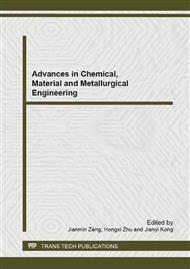p.731
p.736
p.741
p.746
p.751
p.755
p.759
p.764
p.768
Effects of Extraction on the Desulfurization of FCC Diesel by Ultrasound Oxidation Technique
Abstract:
The removal of sulfides (e.g., benzothiophenes) in FCC diesel fuel is the most important issue. Here, sulfides were removed by catalytic oxidation them into sulfones by H2O2-formic acid and solvent extraction induced by ultrasound irradiation. The introduction of ultrasound provides energy for the oxidation reaction, which can assure a complete oxidative desulfurization for sulfides in diesel oil. The effects of extraction solvent, extraction duration, ratio of extractant over extraction times, and oil over extraction times were investigated. Under the optimum condition, the removal efficiency of sulfur compounds and the recovery of the product can amount to 94.2% and above 90%, respectively.
Info:
Periodical:
Pages:
751-754
Citation:
Online since:
January 2013
Authors:
Keywords:
Price:
Сopyright:
© 2013 Trans Tech Publications Ltd. All Rights Reserved
Share:
Citation:


